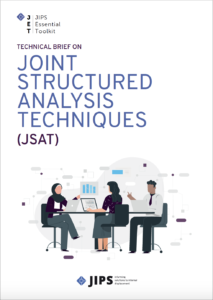 In the analysis phase of a collaborative data process, such as profiling or joint needs assessments, it is important to ensure that all voices are heard. This involves making space to discuss and understand consent, as well as dissent, around the understanding of data.
In the analysis phase of a collaborative data process, such as profiling or joint needs assessments, it is important to ensure that all voices are heard. This involves making space to discuss and understand consent, as well as dissent, around the understanding of data.
These guidelines on Joint Structured Analysis Techniques (JSATs) – grounded on a rich literature review in the fields of psychology, neuroscience and even intelligence – provide a structure to explore and challenge analytical arguments and mindsets collectively, stimulate creativity, and manage uncertainty.
This technical brief, to couple with JIPS’ Joint Analysis Guide, serves as a starting point: it offers a toolbox of facilitation techniques and discusses how they can be used to enable and elevate joint analysis processes, be it as part of a profiling exercise, a joint needs assessment or another collaborative data collection approach. It is aimed at humanitarian and development practitioners engaged in coordinating and facilitating collaborative data processes, notably profiling coordinators, information management officers, and analysts.
The Joint Structured Analysis Techniques technical brief, in its comprehensive overview of existing collaboration techniques, complements the JIPS Essential Toolkit, a collection of easily accessible tools and methodology guides for conducting a profiling exercise phase by phase.